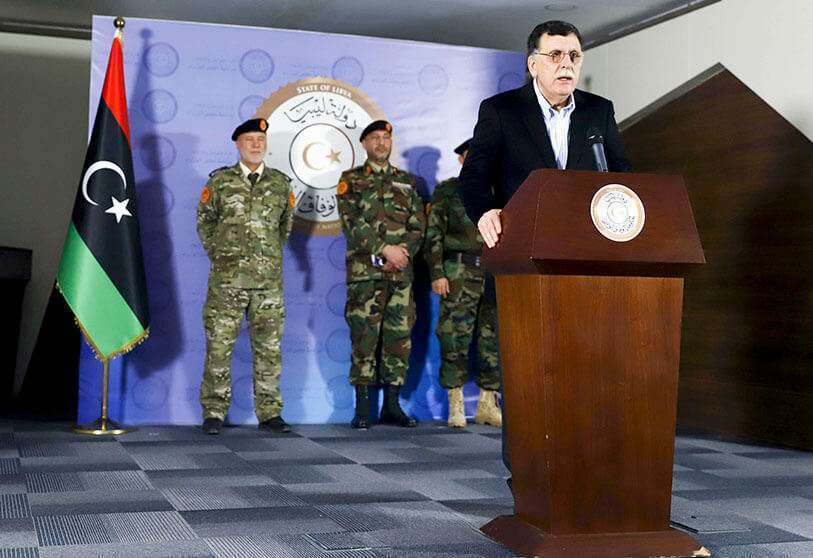Saleh and Haftar, the eastern pulse of two men linked to the fate of Libya

In December 2015, in the middle of the final phase of the negotiations promoted by the then UN special envoy to Libya, Spain's Bernardino León, Article 8 of the draft agreement became an insurmountable obstacle.
Neither the then speaker of the Libyan Parliament (HoR) who fled to the eastern city of Tobruk, Aguila Saleh, nor the head of the proclaimed Libyan National Army (LNA), Marshal Khalifa Haftar, were willing to accept a condition that forced the latter to leave the leadership of the armed forces and left the appointment in the hands of the future unity government.
Even so, urged by the need to form an institution that would facilitate foreign intervention in the fight against the Islamic state, based in the city of Sirte, León forced an agreement with dissidents in the House that facilitated the formation of the aforementioned National Accord Government (NAC) at Tripoli, divided the country in two and laid the foundations for the civil war that has bled Libya dry over the past five years.
Five years later, Haftar and Saleh are again key to the success or failure of the umpteenth peace effort promoted by the UN, which is conditioned by the ambivalent and tense relationship between the controversial politician and the controversial military.
Distant from each other for months, the praise the latter gave to the former during a speech delivered this weekend has surprised local and international political circles and disconcerted analysts about the impact it will have on the peace process and on the negotiations conducted in parallel by Russia and Turkey, the two most influential powers in the country.
"Haftar's action reflects an attempt to get closer to Saleh after months of silent disagreement between the two that has had a great impact on the eastern region," explains Tunisian journalist Mona el Makhrouki.
In the analyst's opinion, the change in Haftar's tone would also seek to "neutralise any agreement that includes excluding the marshal from the leadership of the army, or at least cutting off his wings and ending his absolute control over the eastern region".

Other experts point out, however, that the rapprochement would respond to a common feeling of threat that both would feel vis-à-vis the manoeuvres of the Islamist groups both in the eastern region and in Tripoli and the city-state of Misrata, their main ally.
Harshly criticised, Saleh has attempted in recent days to prevent the plan for the HoR to meet again in the border town of Ghadames, where it would be the first meeting since the House of Representatives departed.
The Libyan media claim that the MPs who promoted the session in the east, most of whom are of an Islamist persuasion, are seeking to replace Saleh, who has attempted to convene a parallel meeting in the city of Benghazi for which he has not yet achieved a quorum.
Deputies close to the current president of the Assembly insist that the Islamists share the strategy of their colleagues in the west, who are inclined to keep the controversial Fayez al Serraj at the head of the presidential council of the GNA, escorted by the current interior minister, Fathi Bashaga, who would be prime minister of the new transition government.
A movement that would reduce Saleh's capacity for political manoeuvre and leave Haftar weakened in the face of the man who, with Turkey's support, brought down the siege that the marshal lifted in Tripoli in April 2019.
Bashaga, originally from Misrata, made a tour of several capitals last week that culminated in a significant visit to Paris, to date one of Haftar's main supporters, along with Russia.
The trip took place just a few days after the UN concluded its second round of negotiations without being able to agree on the composition of this new unity government, in which Bashaga's name appeared as a candidate for prime minister.
Weeks earlier, the United Nations' special envoy for Libya, Stephanie Williams, had reached an agreement to hold legislative elections on 24 December 2021.
And she promoted a pact within the 5+5 Military Committee which has made it possible to guarantee a fragile truce, open up trade routes and recover oil production, which has been blocked by Haftar's proxy militias since February.
This is a significant step forward compared to the previous situation, but its possible progress raises doubts as it has not yet been backed by the two rival governments, nor does it have the backing of Russia and Turkey, which are holding parallel negotiations outside the UN.
These obstacles are now compounded by the ambitions and fears of Haftar and Saleh, two men who appear to be linked to Libya's fate.
